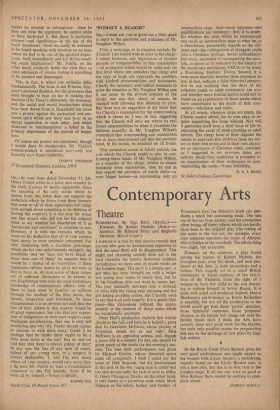Contemporary Arts
Theatre
SUMMERTIME. By Ugo Betti. (Apollo.)-- Komuso. By Robert Nichols. (Arts.)— SUSPECT. By Edward Percy and Reginald Denham. (Royal Court.)
I SUPPOSE it is trite by this time to remark that anyone who goes to Summertime expecting to find the usual Betti will be disappointed. This slight and charming comedy does not in the least resemble the tensely rhetorical political melodramas we have seen of recent weeks on the London stage. The story is a simple one : a girl who has been brought up with a rather wet young man wants• to marry him, but he in his blindness does not want to marry her. The play naturally develops into a reversal of roles with the young man pursuing arid the girl taking avoiding action, but I hardly need to say that it all ends happily. It is a gentle little piece—like Giraudoux without the super- natural or the element of sharp satire which he occasionally produces.
Peter Hall's production exploits this wistful charm to the full, and here he is helped a great deal by Geraldine McEwan, whose playing of Francesca struck me as just right. Miss McEwan is an appealing actress, and, though a jeune filk is a natural for her, she should be given much of the credit for the evening's suc- cess. The best male performance was given by Michael Gwynn, whose thwarted suitor came off completely, I wish I could say the same of Dirk Bogarde, but his performance in the part of the wet young man is rather wet too and droops sadly for lack of style to stiffen it. Gwen Ffrangeon Davies, on the other hand, is very funny as a garrulous aunt, while Mark Dignatn as the idiotic banker and brother of
Francesca's rival for Alberto's hand also pro- duces a small but convincing study. The sets are of the toy farm variety, and the production often brings off funny effects which can hardly have been in the original play (the lowing of the cattle in the last act, for example, every time someone mentions the name of Alberto, who is hidden in the cowshed). The whole thing was slight, but enjoyable.
Kotnuso, on the contrary, a play found among the papers of Robert Nichols, the Georgian poet, after his death, and now pro- duced at the Arts, is both pretentious and a failure. This tragedy set in a small British community in Japan contains all the bric-it- brae of the Twenties, from the right of a woman to have her child to the cad depart- ing to redeem himself in Soviet Russia. It is quite well acted and produced (indeed, Houor Blacktnan's performance as Karin Ballentine is notable), but not all the production in the world could get past those 'poetic' speeches, those 'symbolic' moments, those 'pregnant' silences, as the temple bell clangs out over the British tennis club. I think the Arts have recently done very good work for the theatre, but their only possible excuse for perpetrating this can be the shortage of new plays by Eng- lish writers.
At the Royal Court Flora Robson gives the very good performance one might expect as the woman with a past. Suspect, a melodrama vaguely based on the Lizzie Borden case, is not a new play, but this is its first visit to the London stage. If all the cast were as good as Miss Robson there would be nothing to com- plain about,
ANTHONY HARILLY










































































 Previous page
Previous page